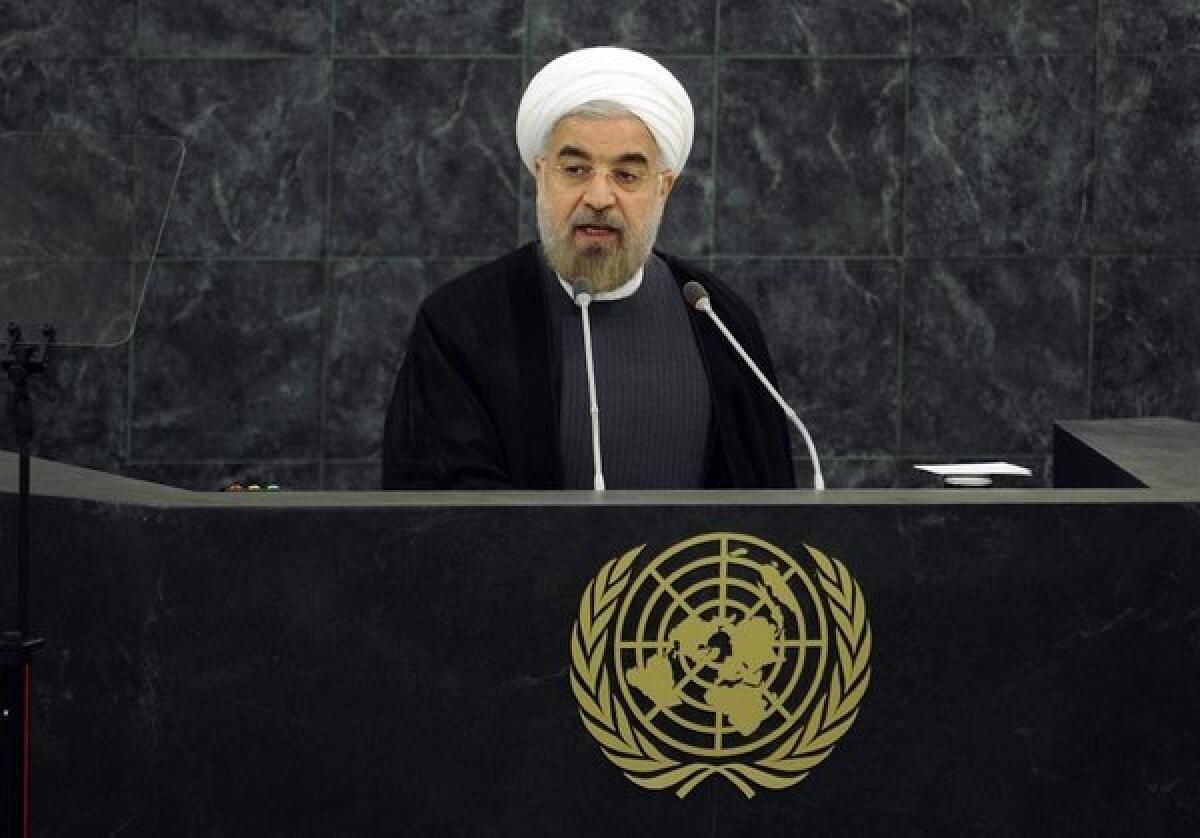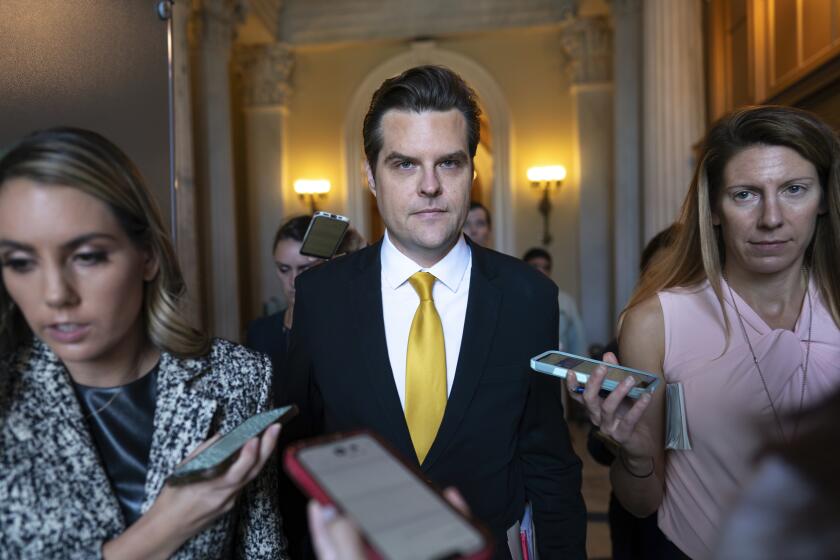Charmed by Rouhani, but only to a point

NEW YORK â How long does it take for a charm offensive to wear thin?
By the end of a long week of glad-handing at the United Nations, even Iranâs new president, Hassan Rouhani, was beginning to sound a little tired of his hazy talking points.
âGlobal challenges require collective responses,â he told foreign policy pundits in a hotel ballroom on Thursday through an interpreter, his voice slightly hoarse after too many meetings and interviews. âWe can turn the turbulent past into a beacon lighting the path ahead.â Whatever that means.
Rouhaniâs main message to the U.S. and the rest of the world was undeniably refreshing: Iran wants to work quickly and seriously to end the dangerous confrontation over its nuclear programs.
âMy government is prepared to leave no stone unturned in seeking a mutually acceptable resolution,â he promised. âWe are prepared to remove any ambiguity and answer any reasonable question.â
But when it came to specifics â what concrete steps is Iran prepared to take to meet the rest of the worldâs concerns? â Rouhani was just as vague as his predecessors. When pressed, he either ducked the question or retreated to Iranâs insistence that it has the same right to enrich uranium for peaceful purposes as any other country. (He doesnât mention Iranâs secret enrichment facilities.)
Retaining the right to enrich uranium is a pillar of Iranâs foreign policy. In a meeting with nuclear experts and former diplomats Wednesday, Rouhani was more specific, saying Iran wants to enrich enough uranium to provide a reliable fuel supply for at least one nuclear power reactor.
But if Iran insists on that, it will be a major sticking point in negotiations. âThat would require tens of thousands more centrifuges than they have now,â warned Gary Samore, a former Obama administration official who was in the meeting. âThat wouldnât provide the assurance we need that they couldnât move toward nuclear weaponsâŚ. I went in pretty skeptical, and my skepticism was reinforced.â
Of course, Rouhani didnât want to make concessions in advance of real negotiations. But on other issues too the professorial president bumped into the limits on the amount of charm his boss, Supreme Leader Ali Khamenei, had authorized him to employ.
He bobbled the predictable question about Iranâs past Holocaust denial. âIâm not a historian,â he said, then tried to avoid the word âholocaust,â and eventually settled on a line condemning all Nazi crimes no matter who the victims were. (Memo to staff: When the wording matters to your audience, make sure the boss rehearses the answer.)
And he backed out of an opportunity to shake hands with President Obama â or, as a hard-line newspaper in Tehran put it, to place his âclean hands ⌠in Obamaâs bloody grip.â Still, he did talk with Obama for about 15 minutes by phone from his limousine on the way to the airport on Friday â the first such contact between Iranian and American leaders since the 1979 revolution.
Those were mostly symbolic issues, but they revealed the constraints on Rouhaniâs running room. Khamenei sent him off to New York with a widely noticed speech calling for âheroic flexibilityâ in Iranâs diplomacy. But Khamenei also said: âWhen a wrestler is grappling with an opponent and shows flexibility for technical reasons, let him not forget who his opponent is.â
The more impressive charm offensive, in fact, came not from Rouhani but from his ebullient foreign minister, Mohammad Javad Zarif. After finishing a half-hour one-on-one session with Secretary of State John F. Kerry, Zarif announced that they had agreed to the shape of talks that could resolve the nuclear issue within a year.
âIâm optimistic,â Zarif proclaimed in the fluent English he perfected during five years as his countryâs representative in New York. âWe will move forward, but we will test each other as we go along.â
A U.S. diplomat said Zarifâs description was a little exaggerated but added: âIn the two years Iâve been doing this, no Iranian Iâve met with has sat down and said in such expansive terms, âHereâs what weâre willing to talk about.ââ
Another cause for optimism is that neither side is making this an all-or-nothing proposition, leaving open the possibility of smaller steps in hopes that they lead to a comprehensive deal.
And itâs very good news that Rouhani wants to move fast, even if thatâs only because Khamenei has given him limited time to prove that sanctions will ever be relaxed and that the United States isnât simply seeking regime change. Until now, the United States, Israel and their allies feared that the Iranians were merely playing for time, time to work toward a nuclear weapon while the diplomats talked. If Iranâs leaders agree that time is short and act accordingly, real progress is possible.
For all the haziness of Rouhaniâs rhetoric, at least one of his bromides was true: This is a window of opportunity, and we should seize it â if only to determine whether thereâs substance behind the charm.
Twitter: @DoyleMcManus
More to Read
A cure for the common opinion
Get thought-provoking perspectives with our weekly newsletter.
You may occasionally receive promotional content from the Los Angeles Times.











